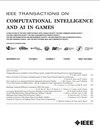简化扑克中基于期望-最大化和序列预测的对手建模
Q2 Computer Science
IEEE Transactions on Computational Intelligence and AI in Games
Pub Date : 2017-03-01
DOI:10.1109/TCIAIG.2015.2491611
引用次数: 18
摘要
我们考虑在一个隐藏信息游戏中在线学习有效策略的问题,该游戏针对的是策略发生变化的对手。我们想模仿和利用对手,并为此提出三个建议;首先,使用期望最大化(EM)算法推断其隐藏信息;其次,使用序列预测方法来预测其动作;第三,在与对手的比赛之间模拟我们的代理人和对手之间的比赛模型。我们的方法不需要游戏规则之外的知识,也不假设对手的策略是固定的。在简化扑克游戏中的实验表明,它提高了最先进的无遗憾学习算法的平均每场比赛的回报。本文章由计算机程序翻译,如有差异,请以英文原文为准。
Opponent Modeling by Expectation–Maximization and Sequence Prediction in Simplified Poker
We consider the problem of learning an effective strategy online in a hidden information game against an opponent with a changing strategy. We want to model and exploit the opponent and make three proposals to do this; first, to infer its hidden information using an expectation–maximization (EM) algorithm; second, to predict its actions using a sequence prediction method; and third, to simulate games between our agent and our opponent model in-between games against the opponent. Our approach does not require knowledge outside the rules of the game, and does not assume that the opponent’s strategy is stationary. Experiments in simplified poker games show that it increases the average payoff per game of a state-of-the-art no-regret learning algorithm.
求助全文
通过发布文献求助,成功后即可免费获取论文全文。
去求助
来源期刊

IEEE Transactions on Computational Intelligence and AI in Games
COMPUTER SCIENCE, ARTIFICIAL INTELLIGENCE-COMPUTER SCIENCE, SOFTWARE ENGINEERING
CiteScore
4.60
自引率
0.00%
发文量
0
审稿时长
>12 weeks
期刊介绍:
Cessation. The IEEE Transactions on Computational Intelligence and AI in Games (T-CIAIG) publishes archival journal quality original papers in computational intelligence and related areas in artificial intelligence applied to games, including but not limited to videogames, mathematical games, human–computer interactions in games, and games involving physical objects. Emphasis is placed on the use of these methods to improve performance in and understanding of the dynamics of games, as well as gaining insight into the properties of the methods as applied to games. It also includes using games as a platform for building intelligent embedded agents for the real world. Papers connecting games to all areas of computational intelligence and traditional AI are considered.
 求助内容:
求助内容: 应助结果提醒方式:
应助结果提醒方式:


